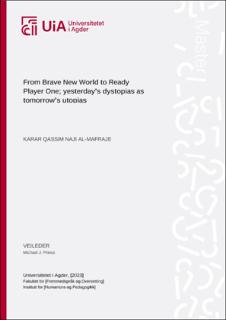| dc.contributor.advisor | Prince, Michael J. | |
| dc.contributor.author | Naji Al-Mafraje, Karar Qassim | |
| dc.date.accessioned | 2023-06-21T16:23:28Z | |
| dc.date.available | 2023-06-21T16:23:28Z | |
| dc.date.issued | 2023 | |
| dc.identifier | no.uia:inspera:146525594:2111965 | |
| dc.identifier.uri | https://hdl.handle.net/11250/3072513 | |
| dc.description.abstract | The purpose of this thesis is to investigate the evolution of literary utopias and dystopias in
light of what I consider to be the new master narrative of post-humanism. The inspiration for
this project has been Yuval Noah Harari’s Homo Deus (2017), which details some of the
challenges and opportunities we might face in the future. This thesis will therefore explore the
themes of his work and try to assess how this technological and ideological development
changes our perception of an ideal society. I start this project by clarifying utopia and
dystopia, before delving into a history of post-humanist ideology up to the present moment.
This thesis then attempts a reading of Brave New World (1932) by Aldous Huxley and Ready
Player One (2011) by Ernest Cline. This reading of these two works will be a twofold
attempt, where a comparison of traditional liberal humanist readings will be compared to
post-humanist understandings. What this hopefully highlights is how post-humanism changes
the definitions of what constitutes utopias and dystopias. Finally, I want to compare the two
works and hopefully glean new insights about how post-humanism redefines ideal visions and
ideal societies and avoiding the dangers of both utopias and dystopias in the post-human age. | |
| dc.description.abstract | | |
| dc.language | | |
| dc.publisher | University of Agder | |
| dc.title | From Brave New World to Ready Player One; yesterday's dystopias as tomorrow's utopias | |
| dc.type | Master thesis | |
